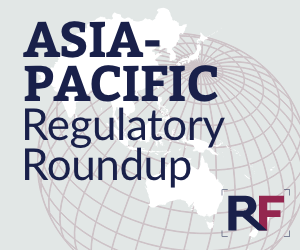Asia-Pacific Roundup: TGA proposal warns of continuing cost pressures
 Advertising, Promotion and LabelingAsiaChemistry, Manufacturing and Controls (CMC)Diagnostics/IVDsMedical DevicesOceaniaPharmaceuticals
Advertising, Promotion and LabelingAsiaChemistry, Manufacturing and Controls (CMC)Diagnostics/IVDsMedical DevicesOceaniaPharmaceuticals Advertising, Promotion and LabelingAsiaChemistry, Manufacturing and Controls (CMC)Diagnostics/IVDsMedical DevicesOceaniaPharmaceuticals
Advertising, Promotion and LabelingAsiaChemistry, Manufacturing and Controls (CMC)Diagnostics/IVDsMedical DevicesOceaniaPharmaceuticals